UPPER SCHOOL CURRICULUM
Equipping students to know Truth, pursue academic excellence, and live with integrity.
Basics for a Biblical Worldview - Grade 6
Middle-school students are daily confronted with worldviews that want to win their heart. Basics for a Biblical Worldview helps students distinguish a biblical worldview from false worldviews and equips them to live out a biblical worldview. Students learn to relate the story of Scripture to basic Christian beliefs and values as they learn what the Bible says about their identity, work, relationships, society, and belief system (Bob Jones University Press).
Old Testament Survey - Grade 7
This course focuses on giving each student an overview of the big story of Scripture. Throughout the course, students will study and recognize the big story, Creation, Fall, and Redemption, in the Old Testament in individual narratives, and they will develop an understanding of the Old Testament’s application to the New Testament. Ultimately, students will learn to conduct their own, independent Bible studies as they gain principles of hermeneutics and an understanding of biblical theology (Bob Jones University Press).
New Testament Survey I - Grade 8
Students will continue to follow the unified story of the Bible, with special focus on the Gospels and the life of Christ. The Gospels present the life of Christ as the fulfillment of God’s redemptive plan as promised in the Old Testament. With age and developmentally appropriate content, this course will prepare students to live with Christlikeness in our world today, teaching them crucial Bible study skills for interpretation and application (Bob Jones University Press)
New Testament Survey II - Grade 9
The second part of a course of study begun in eighth grade, this class focuses on biblical events that took place after the resurrection of Christ. This course reveals the Bible as the true story of what God is doing to glorify Himself by redeeming His fallen creation. Students will explore Acts, the Epistles, and Revelation. The book of Acts covers Christ’s role in the redemptive storyline of the development of His church. The Epistles show students the truths that ground believers and allow them to live out the Great Commission until Christ returns—these truths are the doctrinal propositions and applicational imperatives of Christianity. Finally, the students will see the climactic fulfillment of His triumph over all things in Revelation. Designed to depart from the traditional lecture method of Bible classes, this course uses multiple teaching strategies and learning styles, all focused on clear daily objectives (Bob Jones University Press).
Bible Doctrine - Grade 10
The distinctives of Christian theology make Christianity unique among all other world religions. Areas covered are the Bible, God, Jesus Christ, the Holy Spirit, man, salvation, the church, and the end times. Emphasis is on daily application and being prepared to defend the faith in order to speak intelligently to others about Christianity.
Apologetics - Grade 11
This course encourages students to ask and answer difficult questions like Does the Bible have authority in a world committed to relative truth? Is God Christian? Isn’t Claiming Truth Intolerant? and Is the Bible Anti-Science? Students will be guided to investigate Scripture to answer these questions for the purpose of understanding and defending the Christian faith (Summit Ministries). Students will engage in Bible study, discussion, writing, and other activities that will help them foster a deep knowledge and love of the Word of God.
Church History - Grade 12
The goal of Church History is to acquaint students with the foundational beginnings, subsequent growth, and overall development of the Christian Church up to the present time. The course of study begins with the crucifixion of Jesus, moves through the apostolic period, and proceeds through the centuries to the present. The book of Acts will be studied for the first 40 years of Church History followed by B.K. Kuiper’s book “The Church in History.” The course includes comparison of Christianity with other major world religions.
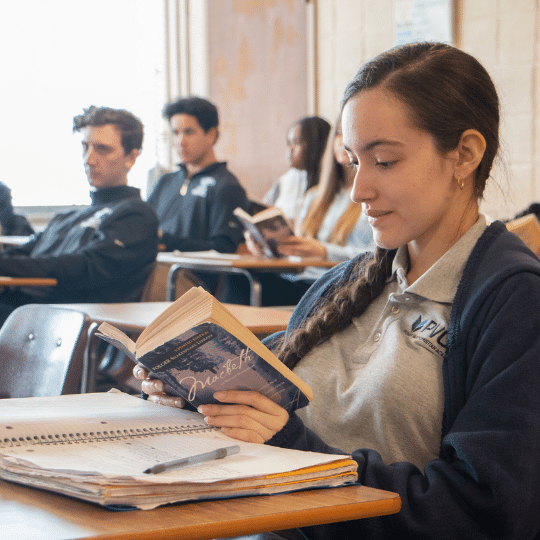
English Grade 6
The goal of English 6 is for students to develop foundational reading, writing, and speaking skills which are imperative for success in the upper school. Using writing strategies from the Institute for Excellence in Writing, literature aligned with the sixth-grade history class like Fever 1793 by Laurie Halse and The Bread Winner by Deborah Ellis, and grammar and vocabulary study, students practice, refine, and build on their previous skills, becoming independent and analytical learners. In addition to emphasizing the development of language arts skills, student will also learn to evaluate all media from a biblical perspective, an essential step in worldview formation.
English Grade 7
English 7 is a continuation of the skill development and worldview formation that began in sixth grade. Highlights of this course include a study of mythology, Shakespeare’s Julius Caesar, and biblical poetry. Students will advance their composition skills, writing longer and more complex pieces, and will also incorporate more types of writing. Students will participate in literature circles, dramatic presentations, and will even have the opportunity to take the National Mythology Exam.
English Grade 8
Students in English 8 are challenged to further their language arts skills and knowledge by reading and writing texts of increasing complexity. The Hobbit by J.R.R. Tolkien, Romeo and Juliet by William Shakespeare, I, Juan Pareja by Elizabeth Barton, poetry, essays, and short stories serve as vehicles for literary analysis, writing, and discussion. Students participate in regular vocabulary and grammar study and are guided to practice thoughtful, evaluative media consumption by comparing the ideas in texts to Scripture.
Literature and Composition – Grade 9
Literature and Composition is an introduction to the foundational reading and writing skills necessary for success in high school and college. Through reading a variety of texts including but not limited to The Pearl, Night, Animal Farm, Hamlet, short stories, and poetry, students will practice literary analysis strategies. Students will also learn the fundamentals of academic writing with a focus on the writing process. Vocabulary study and grammar review are a regular part of course work. This course emphasizes the idea that literature is a means by which people can understand others, themselves, and the world, but asserts that Christian readers should evaluate the ideas in the texts through the lens of Scripture.
Great Works of Western Literature – Grade 10
This course acquaints students with the great works of literature which have influenced the history, culture, and philosophy of the western world. Students will various genres from multiple historical periods. The Odyssey, Beowulf, Fahrenheit 451, poetry, drama, and short fiction and other selections are included in the course. Students will examine the themes and literary techniques of each work. They will also practice literary analysis and critical reading skills, considering each text from a Christian perspective. Writing skills, grammar, and vocabulary will be a regular part of class and students will continue to develop their academic writing skills.
AP Seminar: English 10
AP Seminar is an English course that helps students build foundational writing, collaboration, research, and presentation skills for future success in high school, college, and career. AP Seminar has broad benefits. The course engages a wide range of students. The project-based learning model makes the course more relevant for more students. AP Seminar also builds relevant skills. Students build skills foundational to college and career success, including investigating topics, conducting research, and presenting. They work in teams to investigate a real-world or academic problem and present an argument for their proposed solution.
American Literature – Grade 11
This course is a survey of American literature beginning with Native American and Puritan writings, continuing through the Revolutionary period and Romanticism, and finishing with Transcendentalism. As students read specific works, they will analyze the author’s intent, identifying symbolism, and responding through critical analysis. Through the assigned readings and class discussions, students will examine how the United States of America moved from a God-fearing nation to one that embraces philosophies which oppose Biblical teaching. Thought development, organization, grammar, punctuation, coherency, and general composition skills are emphasized.
AP English Language and Composition: American Rhetoric – Grade 11
This course is structured chronologically as we move through historical writings that comprise the canon of American letters and literature. Particular emphasis will be placed on the rhetorical situation. Students will learn to ask: What is the exigence of the author and how does he achieve his purposes? In order for students to be able to discuss the moves and strategies the writers are making, we will begin the course with lecture and discussion on the rhetorical situation; students will be tested on academic vocabulary, which they will be expected to integrate into their writing and into class discussion.
World Literature – Grade 12
Students will read texts from around the world including Things Fall Apart, The Metamorphosis, Macbeth, Enrique’s Journey, short stories, and poetry. Students will engage with different viewpoints, examining the historical and cultural contexts in which the texts were written, to evaluate themes and philosophies from a Biblical perspective. The course will also continue to strengthen writing and critical thinking skills through regular writing assignments, both in and out of class.
AP English Literature and Composition/Dual Enrollment English 111 (Houghton University)
AP English Literature and Composition focuses on a combination of texts from the 16th century to the late 20th century including A Thousand Splendid Suns, Macbeth, Death of a Salesman, 1984, Frankenstein, short stories, and poetry. Students are guided to draw biblical conclusions as they grapple with complicated moral and ethical conflicts, and they are expected to read carefully, write fluently, and participate enthusiastically to be well-prepared for the AP English Literature and Composition examination in the spring. Those passing the exam are often allowed to “place out” of a required freshman English course in college. Students who choose not to participate in the AP Exam have the option to earn college credit for this course from Houghton University. Because students in this class embark on an advanced level of academic material, an advanced level of scholarship is required: daily discussion of challenging literature, quizzes on focused reading, vocabulary, and grammar, and regular scholarly essays to probe understanding and prompt analytic arguments.


“I quite enjoyed history with Mr. Annis. His passion for history, use of visual aids, and in-depth teaching made history seem like a story, a narrative. He puts great efforts into engaging students and making the class as immersive as possible with antiques and primary sources.”
History/Geography – Grade 6
Continuing the study of US History which was begun in fifth grade, students will examine the development of the United States from expansion in the late 1700’s through the 21st century. In addition, students will develop a working knowledge of the five themes and six essential questions of geography, providing them with knowledge and skills necessary for effective study in future history courses. As student learn about the United States and the rest of the world, they will be directed to consider the relationship between God, humans, and the Earth throughout history and today.
Ancient History – Grade 7
This course begins with the study of Ancient Greece with a focus on its impact on Greek culture, geography, religion, government, and economy which is followed by the study of Ancient Rome, providing an overview of the founding of Rome, the Roman Republic, and the Roman Empire. The course follows Roman history from a monarchy to a democracy, ending with a dictatorship run by emperors. Roman culture, geography, religion, and economy are also investigated. A study of Rome reveals the birth of Christianity and its impact throughout history. Continuing with a study of the Byzantine Empire, an introduction to Islam, the growth of Muslim civilization, and its conflict with Christianity, the course ends with a study of the Middle Ages, feudalism, and the role of the church in medieval society. Critical thinking skills are stressed as students are encouraged to apply, analyze, synthesize, and evaluate what they learn from a Christian perspective, incorporating Scripture to evaluate events. The ultimate goal is to increase awareness of and appreciation for the sovereignty of God throughout history.
World History I – Grade 8
The course begins with the study of the reshaping of medieval Europe, including the development of the middle class, the growth of towns and cities, and the rise of nation-states. Next comes the study of the Renaissance. The shift in European society toward humanism is explored as well as how the dissatisfaction with the Roman Church culminates in the Protestant Reformation. The forerunners and the key figures of the Protestant Reformation are studied along with the history of the early Protestant churches. The course ends with a study of the Age of Exploration and Discovery. The key explorers and the results of their expeditions are studied. Critical thinking skills are emphasized as students gain understanding of God’s providence throughout history.
World History II– Grade 9
World History is designed to study the record of humanity through the development of world cultures. Building on their grade 8 World History course, students will examine the history of human experience from the Absolutist Monarchs to the present. Through this course, students will develop an understanding of God’s work throughout history and the way various events have led to the current state of the world. Class discussion, projects, and readings will provide students with opportunities to develop a biblical view of history.
United States History I – Grade 10
United States History is a study of the United States from the perspective of its Judeo-Christian roots, European beginnings, and transformation into a melting pot for the ethnic groups of the world. Beginning with the settlement of North America and concluding with a study of the Gilded Age of American invention, students will explore questions about the relationships between people and government, the responsibilities of citizens, and the development of the American ethos. Attention will be paid to economics and to the structure of American Government. Readings, with a focus on primary sources, provide the perspectives of the different groups of people who have lived and worked in the United States. Class discussions, and projects are also central in helping students understand how God has worked in American history and the role of Christians in America today.
United States History II - Grade 11
Our study continues in the second year with the advent of the United States on the international stage, the crisis of the Great Depression, WWI, WWII, the Cold War, the social upheaval of the 1960’s, through the events of the 21st Century. Attention will be paid to schools of historical interpretations and historical thinking as well as recognizing the diverse perspectives of different groups within one nation. Students will be asked to consider how Christians can be a godly influence on a nation.
AP United States History - Grade 11
In AP United Stated History students will explore the cultural, economic, political, and social developments that have shaped the United States from c. 1491 to the present. By analyzing texts, visual sources, and other historical evidence, and by writing well-crafted essays expressing historical arguments, students will not only develop their knowledge of U.S. History, but they will also sharpen their analysis skills and their oral and written communication skills. Students will conclude the year by taking the AP United States History Exam, potentially earning college credit for their work in this course. As students consider the events of our national history, they will be guided to evaluate all perspectives according to Scripture and will continue to deepen their Christian worldview.
Issues in Contemporary Culture - Grade 12
Issues in Contemporary Society is an introduction to cultural understanding from a Christian worldview perspective. This course seeks to help students understand what is happening in the world around them, what culture is and how it is shaped and formed, how it influences our thinking and worldview, and how biblical principles apply to the most pressing issues of the day.
Students will use a variety of learning strategies to grow their content understanding, further their critical thinking skills, and develop their ability to articulate their worldview. The primary text for this course is “Understanding the Culture” by Dr. Jeff Myers. Additional readings and supplemental materials will be used as needed.

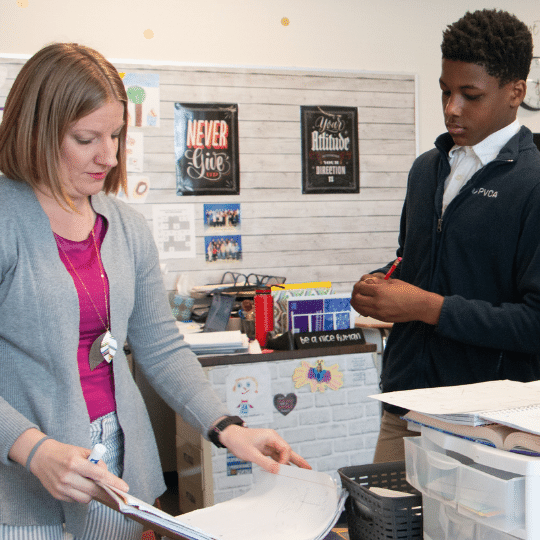
The Math program at Pioneer Valley Christian Academy, especially Calculus and Physics, provided a sound foundation for my studies of Architecture at Syracuse University. I was familiar with all of the concepts, which made for an easy transition to college level math classes.
Math 6
Sixth grade math reviews basic arithmetic skills such as order of operations, fractions, decimals, proportions, solving equations, and more. Using Prentice Hall’s Mathematics: Course 1, students will solidify and build upon the math skills they developed in elementary school, and they will acquire the basic algebra and geometry skills that are foundational in later math courses. Students will also be instructed in practical matters like note-taking, organization, and math-related study skills. God’s traits including His orderliness, infinity, immutability, and universality will also be explored through mathematical study.
Math 7
Math 7 includes a review of arithmetic operations and continues with basic algebraic skills. Review and extension of decimal numbers, fractional parts, place value, prime and composite numbers, linear measurement, area, perimeter, volume, percent, ratio, and algebraic equations are emphasized. Prentice Hall’s Mathematics: Course 2 is the primary text. This course also reveals how God emphasizes the importance of mathematical patterns in His creation through the Fibonacci Sequence.
Honors Math 7
Honors Math 7 includes similar topics to Math 7 but also includes more advanced topics like irrational numbers, Pythagorean theorem, and graphing. Students in honors math courses should expect to display greater independence and a willingness to engage in challenging critical-thinking and problem-solving activities.
Pre-Algebra
Pre-algebra is a transitional course between arithmetic and algebra. Topics include a review of arithmetic operations, solving equations and inequalities, graphing coordinates, rations and proportions, precents, measurement, and geometry. Students will continue to develop an understanding of how math reflects the attributes of God.
Honors Pre-Algebra
Honors Pre-Algebra addresses similar topics to Pre-Algebra but includes more advanced topics as well including additional units pertaining to statistic and geometry. Students in honors math courses should expect to display greater independence and a willingness to engage in challenging critical-thinking and problem-solving activities.
Algebra I
Algebra I develops the meaning of algebraic sentences, rational numbers, operations of polynominals and real number equations; the solution of linear equations, systems of equations, and quadratic equations by factoring; coordinate geometry, simplification of algebraic and rational expressions; and solving of work problems by translating words to mathematical symbols. Alegebra I is standard for college preparatory students to introduce the trigonometric functions, their graphs, basic properties, and selected relationships as reflecting God’s order.
Honors Algebra I
Honors Algebra I addresses the same topics as Algebra I but provides students with increased opportunities to develop a deeper understanding of each mathematical principle. Students in the class are also instructed in how to apply their skills in more complex and diverse mathematical situations to prepare them for success in higher level math courses.
Algebra II
Algebra II Prerequisite: Algebra I
Algebra II is a development of rational and radical expressions, linear and polynomial equations and inequalities, radical and quadratic equations, systems of equations,
exponents, complex numbers, conic sections, and basic trigonometry. (Optional: study of logarithms and matrices). Algebra II is a standard college preparatory level course in which students discover the precision and interrelationships of our counting system as part of the plan of God.
Honors Algebra II
This course builds upon the skills developed in Honors Algebra I. Topics covered in depth include advanced functions, polynomial, exponential and logarithmic functions, and matrices. The real number system is extended to include complex numbers. There is an emphasis on applications and appropriate graphing calculator use. All topics are studied from an algebraic, graphical, and numerical approach, revealing God’s order and consistency.
Geometry
Geometry Prerequisite: Algebra I
Geometry builds upon the material covered in Algebra I. The course will cover geometric figures, transformations, triangle relationships, measuring in planes and space, reasoning and parallel lines, proofs, similarities, and some trigonometry principles. Within those areas of study, students will discover the attributes of God as the creator of mathematics and geometric principles.
AP Pre-Calculous
Advanced Mathematics Prerequisite: Algebra II
AP Precalculus centers on functions modeling dynamic phenomena. This research-based exploration of functions is designed to better prepare students for college-level calculus and provide grounding for other mathematics and science courses. In this course, students study a broad spectrum of function types that are foundational for careers in mathematics, physics, biology, health science, business, social science, and data science. Furthermore, as AP Precalculus may be the last mathematics course of a student’s secondary education, the course is structured to provide a coherent capstone experience rather than exclusively focusing on preparation for future courses.
Throughout this course, students develop and hone symbolic manipulation skills, including solving equations and manipulating expressions, for the many function types throughout the course. Students also learn that functions and their compositions, inverses, and transformations are understood through graphical, numerical, analytical, and verbal representations, which reveal different attributes of the functions and are useful for solving problems in mathematical and applied contexts. In turn, the skills learned in this course are widely applicable to situations that involve quantitative reasoning.
Statistics
Statistics Prerequisite: Algebra 1
Statistics is designed to be an introduction to the basic concepts and techniques of statistics, and how they are applied to a variety of college majors and career fields. Topics covered include data collection, experiment design, measures of central tendency, variation and standard deviation, probability, hypothesis testing, and correlation and regression. Students will investigate these concepts through the lens of a Christian worldview. They will investigate the validity of data and studies, and the ethics behind various statistical analyses.
AP Calculus AB
AP Calculus Prerequisite: AP Pre-Calculous
AP Calculus includes differentiation of polynomials, exponential and logarithmic functions, explicit and implicit differentiation, applications of the derivative including curve sketching, maxima-minima problems, motions and related rate problems, the Fundamental Theorem of Calculus and techniques of integration, applications of the definite integral including area under a curve, between 2 curves, volume, surface area, pressure, slope fields and motion problems. All topics in the AP Calculus AB course description are covered including L’Hopital’s Rule. Students explore their God given abilities and higher level thinking through the study of Calculus. They see the wonder of God’s creation of mathematics and His design and purpose as He used men to develop and apply mathematical concepts.

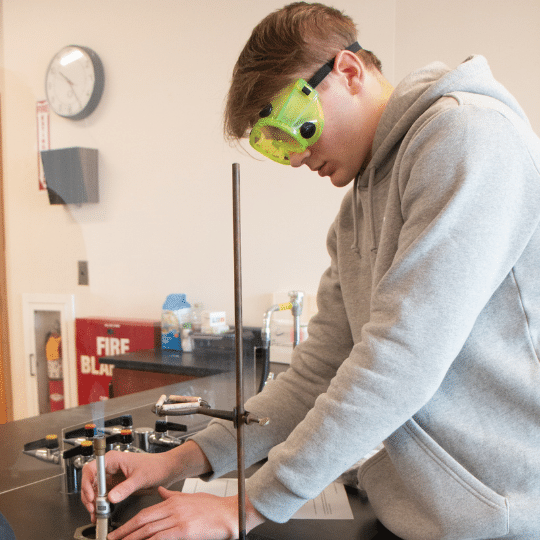
General Science – Grade 6
The goal of sixth grade science is to provide students with the foundational knowledge that is necessary for their success in later science courses. Students in this course will study matter, energy, the earth’s systems, weather and atmosphere, the geosphere, and the biosphere with a focus on how God’s creation can help people understand Him. Students will participate in modeling, lab experiences, and research to develop science skills and content knowledge (Elevate Science, Savvas).
Earth Science – Grade 7
In Earth Science, students will participate in a deep study of God’s creation, the Earth. Earth Science is an expanding study that moves from the Earth’s lithosphere to the rest of the universe. Students will build their critical thinking skills as they study the major theories in earth science and follow those theories through to their conclusions. Throughout the course, they will be guided by biblical and scientific principles, ultimately coming to a better understanding of their Creator and a greater appreciation of His creation (Bob Jones University Press).
Life Science – Grade 8
Life Science is a survey of the structures and functions of living things such as plants, animals, and human beings. These concepts are unfolded as a quest to understand the life that God has created. Case studies, web quests, lab activities, ethics boxes, and questions help students think like scientists and see life science from a biblical perspective (Bob Jones University Press)
Biology
Biology exposes students to a broad survey of content. Its subjects include but are not limited to the molecular basis for life, the cell and cell processes, and genetics. Students will also examine the differences between naturalism and creationism, using Scripture and science to discover God’s hand in creation. Lab work and modeling are a regular part of class activities. Students will continue to practice science-related writing skills.
Honors Biology
This honors level course has the same format as Biology. Students who take Honors Biology should prepare for more challenging grading expectations, a greater complexity in assignments, and independent work, including research. There will also be more emphasis placed on mathematics in preparation for upper-level science courses.
Chemistry
Chemistry Prerequisite: Algebra I
Chemistry is the branch of science that is involved in the investigation of the structures, properties, and reactions of matter and the changes that take place as forces act on matter. The course will focus on topics including chemical reactions, bonding and bond theory, stoichiometry, and thermodynamics. Students will be directed to recognize and appreciate the order in God’s universe, as it relates to chemistry. Lab work and modeling are a regular part of class activities. Students will continue to practice science-related writing skills.
Honors Chemistry
Honors Chemistry Prerequisite: Algebra II
This honors level course has the same format as Chemistry. Students who take Honors Chemistry should prepare for more challenging grading expectations, a greater complexity in assignments, and independent work, including research. Lab work and modeling are a regular part of class activities. Students will continue to practice science-related writing skills. There will also be more emphasis placed on mathematics in preparation for college-level science courses. reflecting God’s order, so that students may see the nature and order of God in His creation and use of mathematics.
Anatomy - Grades 11 and 12
Anatomy is an elective operating on a biennial basis. Students will undertake a comprehensive study of the body systems with the goal of preparing for future science courses. They will also discover God’s intentionality, detail, and integration in the creation of humans. Students will participate in labs, including dissections, research, and other projects and activities while continuing to hone their science-related skills.
Physics - Grade 12
Physics Prerequisite: Advanced Math
Physics includes measurement, problem–solving, kinematics, motion in two dimensions, force, work, energy, linear momentum and collisions, circular motion, and gravitation. Other topics are included as time permits. Emphasis is placed on observations, laboratory procedures, and data analysis in numerous experiments and projects. Students study physics to satisfy a God-given curiosity about nature and the universe and to see the character of God revealed through physics.
AP Computer Science Principals
As described by the College Board “AP Computer Science Principles introduces students to the breadth of the field of computer science. In this course, students will learn to design and evaluate solutions and to apply computer science to solve problems through the development of algorithms and programs. They will incorporate abstraction into programs and use data to discover new knowledge. Students will also explain how computing innovations and computing systems, including the Internet, work, explore their potential impacts, and contribute to a computing culture that is collaborative and ethical.” PVCA students who take this course will develop useful computer science skills that will enable them to succeed on the AP Exam in May, but they will also consider how Christians should view technology in light of Biblical teaching on knowledge and stewardship.
AP Computer Science A
Prerequisite Algebra I
AP Computer Science A introduces students to computer science through programming. Fundamental topics in this course include the design of solutions to problems, the use of data structures to organize large sets of data, the development and implementation of algorithms to process data and discover new information, the analysis of potential solutions, and the ethical and social implications of computing systems. The course emphasizes object-oriented programming and design using the Java programming language.


Spanish Grades 6-8
Students in grades 6-8 take Spanish twice per week. They are instructed using the comprehensible input method in which 90% of the instruction is in the target language, Spanish. Students will read, write, listen, and speak while participating in engaging games and activities. Students in 8th grade may be offered an opportunity to take Honors Spanish 1 during their 8th grade year.
Spanish Grades 9-12
The goal of PVCA’s Spanish program is for students to read, speak, listen, and write Spanish fluently. To meet this goal, classroom instruction employs the Comprehensible Input method in which 90% of instruction is offered in Spanish. Students will participate in a variety of games, activities, and projects as a regular part of their coursework.
- Spanish I (Grade 9)
- Spanish II (Grade 10)
- Honors Spanish II (Grade 9/Grade 10)
- Spanish III (Grade 11)
STUDENT ELECTIVES

ART EDUCATION
Students of various learning levels grow in their knowledge of art vocabulary, mediums, materials, and techniques. Units of study vary from year to year, but always include drawing, painting, and sculpture. Students explore and grow in art skills while applying their Christian faith to their artistic choices.
Art for Grades 6-8
Students use a variety of materials and techniques while developing as student artists. Drawing, painting, collage, printmaking, textiles, construction, and ceramics are the mediums used to reinforce the elements and principles of art.
Foundations of Art
This introductory art class gives students the foundational skills for exploring a variety of mediums and materials and developing their understanding of the principles of art. Students are encouraged to see God’s intentional design for the world as they create their own artwork and study the work of influential artists.
Semester-Long Art Electives
After completing the introductory course, Foundations of Art, students are encouraged to continue their art education by taking one, or several, semester-long art courses, such as:
- Drawing
- Painting
- Fiber Arts
- Ceramics

CREATIVE WRITING
Creative writing is a workshop-style course during which students will write, revise, and publish original literary works. Students will write parodies, science-fiction, realistic fiction, drama, poetry, and creative non-fiction. Taking a course like this provides students with an opportunity to develop writing skills, try new forms of writing, give and respond to feedback, and use their God-given creativity to His glory.

MUSIC EDUCATION
Through music education, students have an opportunity to develop both vocal and instrumental skills for the glory of God and the blessing of others. Students who participate in the theater program learn and practice dramatic techniques across genres, enabling them to acquire skills in both production and performance.
General Music 6-8
Middle School General Music is a one semester class that meets three times per week. Throughout the three years of middle school, students will contemplate the creativity, beauty, and complexity of God as the Creator of music in relation to music theory, music history, music appreciation, and the history of jazz.
Choir Grades 6-8
Middle School Choir is an elective that meets three times a week for both semesters. It offers a wonderful opportunity for students to sharpen their musical talents and use them for the glory of God. The choir practices various vocal exercises to strengthen and develop their voices, is exposed to diverse styles of music, and sing two to three part music. Students are given the following performance opportunities throughout the year: Christmas Concert, Spring Musical, and Spring Concert.
Choir Grades 9-12
High School Choir is an elective one-credit course that challenges students in the areas of vocal technique, sight reading, music theory, and ministry. Students are taught that music is one of the gifts God has given us to use in worship. As musicians, we have the unique opportunity to return this gift to God in a way that not only pleases Him, but also encourages and blesses others at the same time. The choir is given the following performance opportunities throughout the year: Christmas Concert, Spring Concert, National Honor Society Program, and Graduation.
Student Worship Team
The student worship team is made up of student musicians and vocalists passionate about worshiping their Lord and Savior. The student worship team leads worship during weekly chapels, special events, and the fall and spring retreats. Students in Audio Engineering and Digital Media also have the opportunity to collaborate with the worship team by coordinating sound production and visual effects.
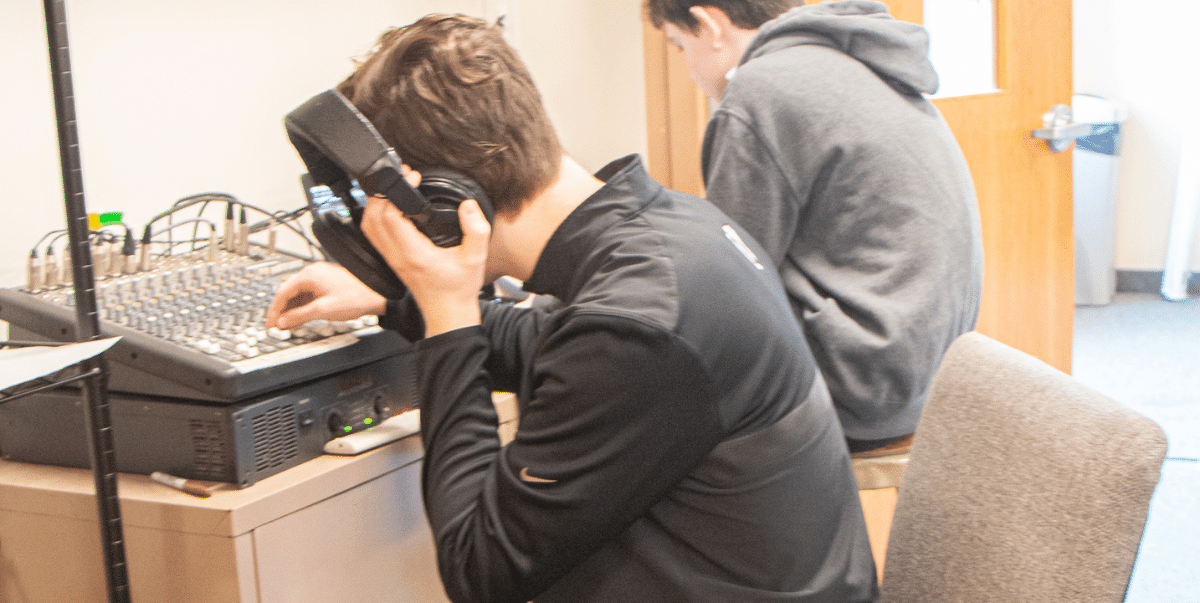
TECHNOLOGY
In grades 6-8, students are introduced to coding, design, and building through a program entitled Empow.me. Students earn “badges” for completing various projects using applications such as TinkerCAD, Minecraft, Lego, Scratch, and Stykz. At the high school level, students are expected to be comfortable with the technology necessary to complete their work, including internet research, presentation programs, Excel, Word, Publisher, graphing calculators, and more.
Technology Electives
Production
Digital Media
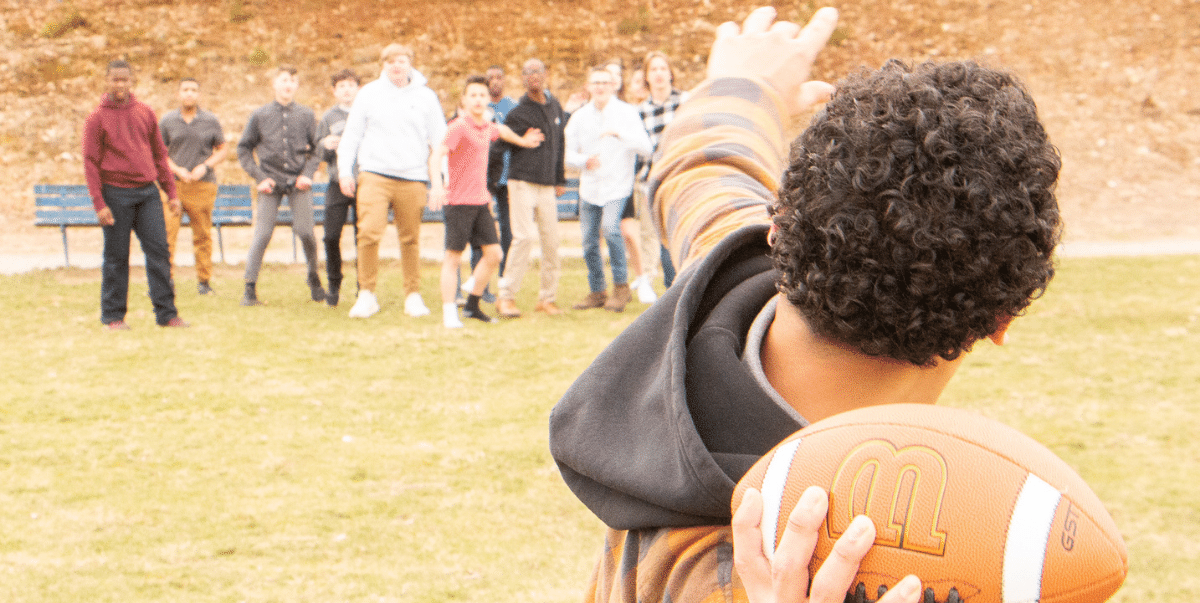
PHYSICAL EDUCATION
We believe the most important measure of our success is how well we represent Christ in all that we do. Athletic abilities are a gift from God; thus, students should work passionately to develop their talents to the utmost for His honor and glory. “Whatever you do, work at it with all your heart, as working for the Lord, not for men” (Colossians 3:23).
Physical Education
-
Young men and young women have separate p.e. classes
-
Upper school students are required to participate in p.e. classes twice per week
DISCOVER PIONEER VALLEY CHRISTIAN ACADEMY
Pioneer Valley Christian Academy
965 Plumtree Rd. Springfield, MA 01119
P: (413) 782-8031 | F: (413) 782-8033
admissions@pvcama.org
quick links
Pioneer Valley Christian Academy
965 Plumtree Rd. Springfield, MA 01119
P: (413) 782-8031 | F: (413) 782-8033
admissions@pvcama.org
Pioneer Valley Christian Academy is one of New England's Private Christian Schools located in Springfield, MA. We offer students access to leading-edge opportunities for intellectual, professional, and leadership development to address the increasingly complex challenges of a global society. Pioneer Valley Christian Academy stands apart from other outstanding schools in New England by combining an exceptional education with Christian faith.
Pioneer Valley Christian Academy admits students of any race, color, and national and ethnic origin to all the rights, privileges, programs, and activities generally accorded or made available to students at the academy. The academy does not discriminate on the basis of race, color, or national and ethnic origin in administration of its educational policies, admissions policies, scholarship and financial aid, athletics, and other school-administered programs.




